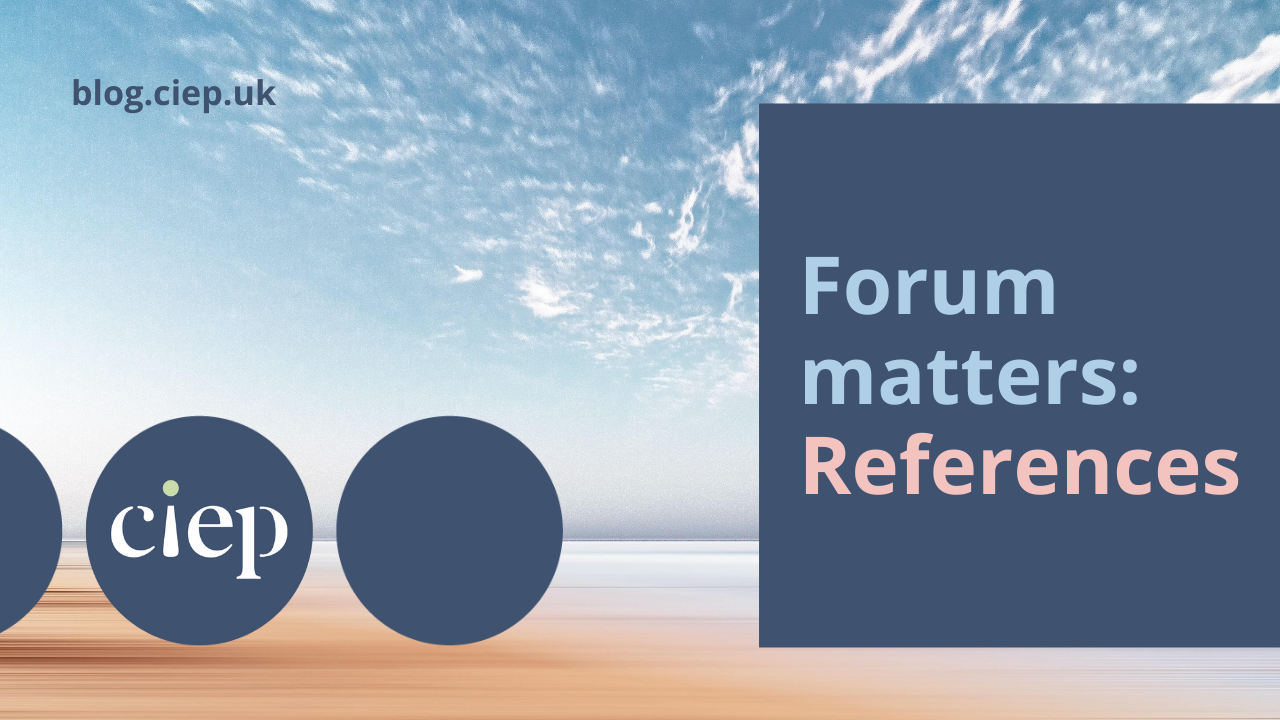This feature comes from the band of CIEP members who volunteer as forum moderators. You will only be able to access links to the posts if you’re a forum user and logged in. Find out how to register.
Mention to an editor that a project contains references and they are likely to envision a long list of citations that may or may not be appropriate or even needed, and that may be incomplete and multi-styled. A search on ‘reference’ brings up over 2,600 posts (about 400 specifically on citations/referencing) across all forums that cover (among other subjects) styles, references to, ways to reference people, using Word, PDF markup, definite articles, the Bible, information sources, languages, macros and the effect of being in different generations.
Essentially, Luke Finley summarised what browsing the forums can do for you in A fun moment courtesy of ProperNounAlyse: ‘I do like those moments when you can make copy-editing look like some kind of dark art.’
Citations
First to the pure business of citations, which is a core activity for all academic editors and for many works of non-fiction. If you are a regular checker of citations and a macro user then you may already have taken advantage of Paul Beverley’s CitationAlyse; if not, then have a look at Citation checking made even easier and its accompanying YouTube video.
If you are in need of reference management software then that is also dealt with on the forums. Although mention of a discount may be outdated by the time you read Using EndNote to style references, the information about its features, new approaches and the subsequent discussion is well worth a read. There are also threads about Word’s Reference tab (see Word Referencing et al.) and all sorts of macros – some of which become reference lists in their own right (Efficient PDF Markup).
Helpful pointers
Software or hardware updates can occasion glitches and if you don’t have your own IT guru or can’t find a solution via googling, then a quick share on the forums can often help you to keep on checking those references (see Copy & paste weirdness – new PC installation). For people to give you the best answers to many of these queries it can help to upload an example file or image, as demonstrated by the thread Macro for endnotes.
If you are still finding your way as an editor, the forums are a great place to sound out approaches to referencing, whether because of inconsistencies in styling, as in Serial commas in text but not citations, which leads to a steer on how to query; or whether it is helping students settle on the best approach, as in Academic copyediting: combinations of citation and style guides. Checking formatting is also dealt with, from problems with numbering in Reference indent query to addressing the titled in Full name or initials after ‘Sir’ in references. The latter thread leads from knights to the invasion of Grenada to indexing seven Sir Johns! Forum members seem well-versed in matters of etiquette, should you need advice, not just on lords but also on References to Professor/Doctor.
If you are seeking guidance specific to a publisher’s way of working then it is wise to put their name in the topic title, as in Palgrave Macmillan style guide. With the number of members who have signed up to the CIEP forums and their range of experience, you are bound to get a useful (and sensible) response that will help you do the best job for that (new) client.
If you are working with a non-fiction self-publisher then you are probably going to have to make many more decisions about how to style the references and be extra careful about checking them – which was the sort of advice sought in Best citation system? – while you will benefit from the sense expressed in Inclusion of the definite article in journal titles.
Specialisms
Thanks to the reach of CIEP recruitment, many language references can be checked with those who really know their etymology. German referencing issues leads to Ancient Egypt, while Dir. – French abbreviation opens up the world of job titles.
Referencing also comes up in fiction, as in references to Age appropriateness? and the place of violence in a children’s fantasy novel; and references to the 1980s in Exposition/First person POV and how different generations might be frustrated to allusions they won’t understand.
The broad church that is editing (and the CIEP) means that whatever your reference requirement you are likely to find an answer, whether it is on Where to check plant (fruit) species, Citing foreign language films in Chicago or ways of Quoting Whole Bible Chapters. This last led to a personal offer of help, which is not uncommon on the forums, as confirmed by the fulsome thanks in Shouting out about Janet!
 About the CIEP
About the CIEP
The Chartered Institute of Editing and Proofreading (CIEP) is a non-profit body promoting excellence in English language editing. We set and demonstrate editorial standards, and we are a community, training hub and support network for editorial professionals – the people who work to make text accurate, clear and fit for purpose.
Find out more about:
Photo credits: beach by Anthony Cantin, bookshelf by Yury Nam, both on Unsplash.
Posted by Harriet Power, CIEP information commissioning editor.
The views expressed here do not necessarily reflect those of the CIEP.


